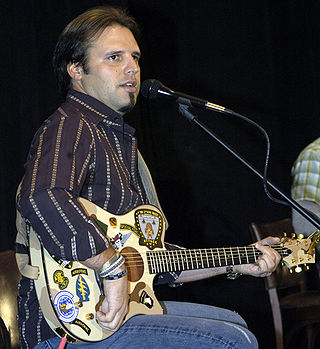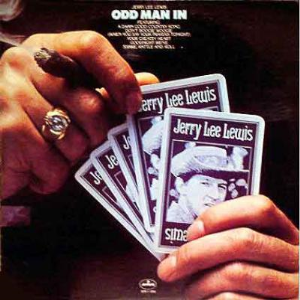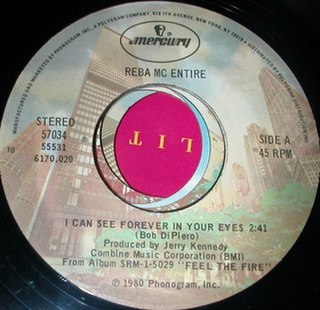
Reba Nell McEntire, or simply Reba, is an American country music singer and actress. Dubbed "the Queen of Country", she has sold more than 75 million records worldwide. Since the 1970s, McEntire has placed over 100 singles on the Billboard Hot Country Songs chart, 25 of which reached the number one spot. She is an actress in films and television. She starred in the television series Reba, which aired for six seasons. She also owns several businesses, including a restaurant and a clothing line.

"Tears on My Pillow" is a doo-wop song written by Sylvester Bradford and Al Lewis in 1958. The composition was first recorded by Little Anthony and the Imperials on End Records and was that group's debut recording under that name. Their original recording of the song became a Billboard top-10 hit, peaking at No. 4, No. 3 in Canada, and was the Imperials' first million-seller. It was also a two-sided hit, with its flip side, "Two People in the World," also becoming a major hit. Although it remains one of the Imperials' signature songs, "Tears on My Pillow" has been extensively covered, including a No. 1 in the UK Singles Chart version by Kylie Minogue in January 1990.

Mark Wills is an American country music artist. Signed to Mercury Records between 1996 and 2003, he released five studio albums for the label – Mark Wills, Wish You Were Here, Permanently, Loving Every Minute, and And the Crowd Goes Wild – as well as a greatest hits package. In that same timespan, he charted sixteen singles on the Billboard country charts, all of which made the top 40. After leaving Mercury in 2003, he signed to Equity Music Group and charted three more singles. Two of these were later included on his sixth studio album, Familiar Stranger, which was released on the Tenacity label in 2008.
"A Poor Man's Roses " is a song was written by Bob Hilliard (lyricist) and Milton De Lugg (composer). The song was popularized by both Patsy Cline and Patti Page in 1957. Cline rerecorded the song with a string arrangement and in stereo, in 1961. Page recorded the song again in 1981.

The discography of American singer Donna Summer includes 17 studio albums and 89 singles, plus several other releases. Her first single, "Wassermann", a German version of the song "Aquarius" from the musical Hair, was released in Europe in 1968 under her maiden name, Donna Gaines. She would become known as Donna Summer from 1974 onwards. Her first full-length album under that name was Lady of the Night.

Reba McEntire is the debut studio album by American country music singer Reba McEntire. It was released on August 15, 1977, by Mercury Records. It featured her first single "I Don't Want to Be a One Night Stand", as well as a cover of the Jennifer Warnes hit "Right Time of the Night", and the Hot hit "Angel in Your Arms". Three of the album's singles cracked the Billboard Country charts, but the album was not a commercial success, failing to chart.
James Layng Martine Jr. is an American songwriter whose compositions have appeared on the country and pop music charts over a four-decade span beginning in the late 1960s. His songs, "Way Down" and "Rub it In", have each been recorded by over 20 artists. In 2013, he was inducted into the Nashville Songwriters Hall of Fame. Some of Martine's writing credits include Elvis Presley's million-selling "Way Down"; The Pointer Sisters' Top Ten "Should I Do It" and Trisha Yearwood's "I Wanna Go Too Far".

Lonesome Standard Time is the seventh studio album by American country artist Kathy Mattea. It was released on September 22, 1992, via PolyGram and Mercury Records. It was recorded during a period when she was experiencing vocal challenges. The project featured songs about heartbreak and loss written by various Nashville writers. It received a mixed critical response, but certified gold in the United States. The album spawned four singles. Both the title track and "Standing Knee Deep in a River " reached the American country chart top 20 in 1993.
"The Greatest Man I Never Knew" is a song written by Richard Leigh and Layng Martine Jr., and recorded by American country music artist Reba McEntire. It released in July 1992 as the fourth and final single from her album For My Broken Heart. The song reached No. 3 on the Billboard Hot Country Singles & Tracks chart in October 1992.

The albums discography of American country singer Reba McEntire contains 32 studio albums, 26 compilation albums, two live albums, three extended plays and has appeared on 28 albums. Of these albums, 27 have received a certification of at least Gold from the Recording Industry Association of America. Her highest-certified album is the 1993 compilation Greatest Hits Volume Two, which is certified quintuple-platinum for U.S. shipments of five million copies. According to RIAA, she has sold 41 million certified albums in the United States, making her the seventh best selling female album artist in the United States.

The singles discography of American country music singer Reba McEntire contains 126 singles. They are further categorized by 100 released as a lead artist, seven as a featured artist and 19 that were issued as promotional singles. In addition to singles, eight unofficial singles were released and made charting positions in both the United States and Canada. After being discovered by Red Steagall, McEntire signed a recording contract with Polygram/Mercury Records in 1975. In 1977, she released her debut, self-titled album, which yielded four singles that low-charting entries on the Billboard Hot Country Songs survey. She had her first major hit as a solo artist with a remake of Patsy Cline's "Sweet Dreams" (1979).

Sheila Marlene Andrews was an American country music singer. Signed to the Ovation label, she recorded three studio albums in her career and released several singles on the Billboard Hot Country Songs including "It Don't Get Better Than This", her highest charting single.

Odd Man In is the 31st album by Jerry Lee Lewis. It was released in 1975 on the Mercury label. The album title was credited to Joanie Lawrence.

The singles discography of American country artist, George Jones, contains 182 singles. Of the total, 136 were released with Jones as the solo artist. In addition, 31 were issued with Jones being part of a collaboration. Thirdly, eight singles were issued with Jones being part of a featured act. Fourthly, seven released were promotional singles. Additionally, 14 songs that are not released as singles are included that made any major chart. Finally, 21 music videos which were first issued as singles are also listed. Jones had his first chart success in 1955 with several top ten Billboard Hot Country Songs singles: "Why Baby Why", "What Am I Worth" and "You Gotta Be My Baby". After several more top ten releases, "White Lightning" became his first to top the Billboard country chart. Along with "Who Shot Sam", both singles were also his first to make the Hot 100 charts.
"Should I Do It" is the title of a song composed by Layng Martine Jr. which in 1981 was a minor C&W hit for Tanya Tucker, becoming a Top 40 hit in 1982 for the Pointer Sisters.
"He Won't Give In" is a song written by Johnny Pierce, and recorded by American country music artist, Kathy Mattea. It was released in May 1985 as the second single from her album From My Heart. The songbecame Mattea's fourth single to reach the top 40 of the American country chart.

"I Can See Forever in Your Eyes" is a song written by Bob DiPiero, and recorded by American country music artist Reba McEntire. It was released in October 1980 as the second single from the album Feel the Fire. The song became a top 20 hit on the American country music chart.

"There Ain't No Future in This" is a song written by Bill Rice and Sharon Vaughn, and recorded by American country music artist Reba McEntire. It was released in November 1983 as the second single from the album Behind the Scene. The song became a top 20 hit on the American country chart.

"He Broke Your Memory Last Night" is a song written by Dickey Lee and Bucky Jones, and recorded by American country music artist Reba McEntire. It was released in June 1984 as the second single from the album Just a Little Love. The song became a top 20 hit on the American country music chart.
"Someone Is Falling in Love" is a song written by Lee Domann and Pebe Sebert, and recorded by American country music artist, Kathy Mattea. It was released in January 1984 as the second single from her self-titled debut album. The song became Mattea's second single to reach the top 30 of the American country chart..














